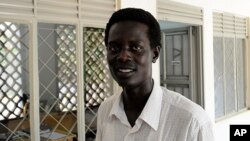Two journalists, detained for two weeks by government security in the new nation of South Sudan, have been released. The two were arrested for publishing an article critical of President Salva Kiir's daughter.
The editor of the Destiny Newspaper, Ngor Garang and deputy editor Dengdit Ayok were released on Friday evening by South Sudan’s National Security Service. They were detained after publishing an article on October 26, criticizing President Kiir for allowing his daughter to marry an Ethiopian.
Ayok, the author of the piece, said President Kiir had “stained his patriotism” by giving his daughter to “an alien.” Garang was detained on November 1 and Ayok was arrested four days later.
Speaking on Saturday, Dengdit Ayok said he was released without warning and no charges were filed against him.
"The security handed us over to police and then we were taken to the minister of interior. We met the inspector general of the police. He informed us the president of the republic Salva Kiir Mayardit has pardoned us and that he has decided not to take us to court," he said.
Internal Security Chief Akol Kur initially accused Garang and Ayok of publishing “illicit news” which invaded the privacy of the president. When reached by VOA News, Akol Kur refused to comment about the detentions and alleged beating.
Ayok said security officers beat him when he was arrested on November 5. He said he was then taken to a cell and fed only one meal per day. According to Ayok the prison held as many as 30 others accused of various crimes, including terrorism and cattle rustling.
After the arrest of Garang and Ayok, the Destiny was forced to shut down publication. Officials from the paper say they do not know when they will be allowed to publish again.
Despite spending 13 days in prison, Ayok stands behind his controversial article.
“I didn’t break the law. My article was complying with the law," he said. "We have the only law which is the supreme law of the land. That is the transitional constitution of the republic of South Sudan. The press bill is not yet passed and even the security bill is not yet passed.”
A draft bill to govern media in South Sudan has been submitted to parliament, but has yet to be passed. Speaking at a meeting last week, the Executive Secretary of the Association For Media Development in South Sudan called on lawmakers to pass the press law as soon as possible.












